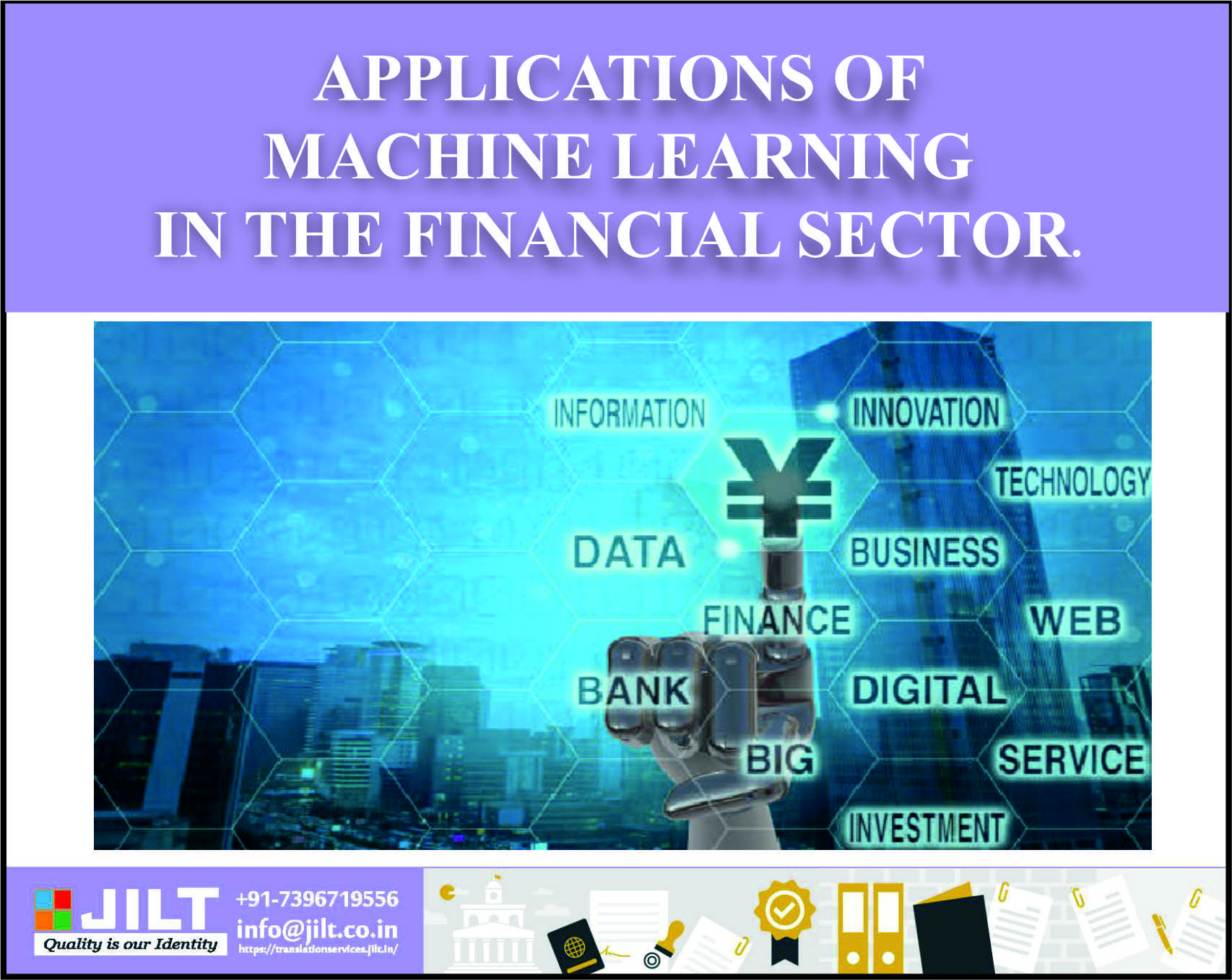
LISTED BELOW ARE TEN OF THE MANY APPLICATIONS OF MACHINE LEARNING IN THE FINANCIAL SECTOR.
by Dr. Abu Mazhar Khalid Siddique - December 12, 2023
Machine learning empowers financial institutions to harness the power of predictive analytics, enabling them to make data-driven decisions. By analyzing historical data and identifying patterns, machine learning models can forecast future trends, market movements, and customer behaviors. This foresight is invaluable for strategic planning, investment decisions, and overall risk management. Through the integration of machine learning, businesses in the finance sector can stay ahead of market dynamics and proactively adapt their strategies.
One of the critical functions in finance is assessing credit risk when extending loans or credit to individuals or businesses. Machine learning algorithms revolutionize this process by analyzing a myriad of factors, including credit history, income, debt levels, and behavioral patterns. This comprehensive evaluation leads to more accurate credit risk assessments, reducing the likelihood of defaults and improving the overall health of lending portfolios. Automated credit risk assessment is a pivotal aspect of machine learning in finance, enhancing the precision and efficiency of lending practices.
Portfolio Management Optimization
In the realm of investment management, machine learning contributes significantly to optimizing portfolio strategies. Traditional portfolio management relies on historical data and static models. However, machine learning algorithms continuously adapt to evolving market conditions, adjusting investment portfolios dynamically. This adaptive approach improves the accuracy of investment decisions, ensuring that portfolios are aligned with current market trends and risk factors. Businesses implementing machine learning in finance gain a competitive edge in optimizing returns and managing investment risks effectively.
Fraud Prevention and Security Enhancement
The financial sector is particularly susceptible to fraudulent activities, and machine learning serves as a formidable ally in the fight against financial crimes. Through advanced anomaly detection and pattern recognition, machine learning models can identify suspicious transactions, unauthorized access, and other fraudulent behaviors in real-time. This proactive approach enhances security measures, safeguarding both customer assets and the integrity of financial systems. Businesses adopting machine learning in finance fortify their defenses against ever-evolving threats in the digital landscape.
Fraud Prevention in Document Handling
Machine learning algorithms excel at detecting anomalies and patterns indicative of fraudulent activities. When applied to document handling processes, these algorithms can identify irregularities in document content, structure, or metadata that may suggest fraudulent manipulation. This proactive fraud prevention adds an extra layer of security to financial documents, protecting businesses from potential financial losses and reputational damage.
Regulatory Compliance Automation
Adhering to regulatory requirements is a paramount concern for financial institutions. Machine learning streamlines regulatory compliance by automating the monitoring and reporting of financial activities. These algorithms can analyze vast datasets to ensure that transactions comply with regulatory standards, reducing the risk of penalties and legal complications. The automation of compliance processes not only enhances accuracy but also frees up human resources to focus on more complex regulatory challenges that require nuanced interpretation and decision-making.
Customer Segmentation and Personalized Marketing
Machine learning transforms customer relationship management in finance by enabling precise customer segmentation and personalized marketing strategies. By analyzing customer behaviors, preferences, and transaction histories, machine learning models can identify distinct customer segments. This insight allows financial businesses to tailor their marketing efforts, offering personalized product recommendations, targeted promotions, and customized services. This personalized approach not only enhances customer satisfaction but also fosters long-term customer loyalty.
Cost Reduction and Operational Efficiency
Implementing machine learning in finance contributes to significant cost reduction and operational efficiency gains. By automating repetitive and time-consuming tasks, such as data entry, document processing, and routine decision-making, businesses can streamline their operations. This not only reduces the reliance on manual labor but also minimizes the likelihood of errors. The resultant operational efficiency leads to cost savings and allows financial institutions to reallocate resources towards more strategic and value-added activities.
Advanced Financial Forecasting
Machine learning's prowess extends to sophisticated financial forecasting, offering businesses a tool to navigate future financial landscapes with greater precision. By analyzing a multitude of financial variables, economic indicators, and market trends, machine learning models can generate accurate forecasts for revenue, expenses, and overall financial performance. This proactive approach allows financial institutions to make strategic decisions, allocate resources efficiently, and adapt to changing market conditions, contributing to long-term financial sustainability.
Intelligent Risk Mitigation
Machine learning contributes to intelligent risk mitigation strategies by identifying potential risks and suggesting proactive measures to address them. Whether it's market fluctuations, geopolitical events, or operational challenges, machine learning models can assess historical data and current conditions to provide insights into potential risks. This enables businesses to implement targeted risk mitigation strategies, reducing the impact of unforeseen events on their financial stability.
Behavioral Analysis for Investment Strategies
In the realm of investment, machine learning excels in behavioral analysis, providing a deeper understanding of investor sentiments and market dynamics. By analyzing social media, news articles, and market reactions, machine learning models can gauge investor sentiment and identify emerging trends. This information is invaluable for shaping investment strategies, optimizing asset allocation, and staying ahead of market sentiment shifts. Businesses leveraging machine learning in finance gain a nuanced understanding of market psychology, enhancing their ability to make informed investment decisions.
Continuous Model Improvement
Machine learning systems are designed to evolve and improve continuously. As more data becomes available and the system processes new information, the algorithms adjust their parameters to enhance accuracy and performance. This continuous learning cycle ensures that the machine learning models in finance remain adaptive to changing market dynamics, regulatory environments, and business landscapes. The ability to self-optimize positions businesses at the forefront of innovation, providing them with a sustainable competitive advantage in the financial sector.
Enhanced Document Security and Privacy
Machine learning in document management adds an extra layer of security to sensitive financial documents. Through pattern recognition and anomaly detection, these algorithms can identify potential security threats or unauthorized access attempts. This not only safeguards confidential financial information but also ensures compliance with data protection regulations. The integration of machine learning in document management aligns with the increasing emphasis on data privacy and security in the financial industry.
Automated Invoice Approval Hierarchies
Machine learning algorithms contribute to the optimization of invoice approval workflows by learning from historical approval patterns. These systems can dynamically adjust approval hierarchies based on past decisions and organizational preferences. This adaptive approach reduces bottlenecks, accelerates approval processes, and ensures that invoices are routed to the appropriate personnel for efficient processing.
Strategic Cash Flow Management
Beyond predicting cash flow needs, machine learning in finance facilitates strategic cash flow management. By analyzing historical spending patterns, invoice processing times, and payment cycles, machine learning models can provide valuable insights into optimizing cash flow. This includes identifying opportunities for early payment discounts, managing working capital more effectively, and mitigating cash flow constraints during peak operational periods.
Vendor Performance Evaluation
Machine learning aids in evaluating vendor performance by analyzing historical data and real-time metrics. These algorithms can assess factors such as delivery times, accuracy of invoices, and adherence to contractual terms. This data-driven evaluation enables businesses to make informed decisions about vendor relationships, rewarding reliable suppliers and addressing concerns with underperforming ones. Ultimately, this contributes to stronger partnerships and more efficient supply chain management.
Predictive Maintenance for Financial Systems
Incorporating machine learning in finance extends beyond accounts payable to predictive maintenance for financial systems. These algorithms can analyze usage patterns, system performance metrics, and potential vulnerabilities to predict and prevent system failures. This proactive approach minimizes downtime, ensures the reliability of financial systems, and enhances overall operational resilience.
Continuous Learning for Evolving Compliance
The dynamic nature of regulatory environments requires continuous adaptation and learning. Machine learning in finance not only helps in maintaining compliance through audit trails but also evolves alongside regulatory changes. These systems can analyze regulatory updates, adapt their algorithms, and ensure that document management practices align with the latest compliance standards. This adaptability is crucial for businesses seeking to stay ahead of regulatory shifts and minimize compliance-related risks.
The integration of machine learning in finance and document management goes beyond process optimization, offering a comprehensive set of capabilities that enhance security, compliance, and overall operational efficiency. As businesses navigate the complex landscape of financial operations, leveraging machine learning becomes imperative for staying competitive and resilient in the face of evolving challenges. Successful implementation requires a strategic approach, emphasizing data quality, continuous monitoring, and alignment with broader organizational goals.
As technology continues to advance, businesses in the financial sector are increasingly recognizing the transformative potential of machine learning, positioning themselves to thrive in a rapidly evolving industry landscape.
Machine learning in finance extends far beyond basic automation, offering a comprehensive suite of capabilities that transform financial operations and decision-making. From optimizing payment processes and enhancing invoice matching to advanced financial forecasting and continuous model improvement, businesses embracing machine learning are at the forefront of a financial revolution. As the financial landscape continues to evolve, the strategic integration of machine learning will undoubtedly play a pivotal role in shaping the future of finance.
Our organization employs native-speaking translators who can provide certified translation services in any language. We provide translation services in English (Urdu), Arabic (Spanish), German (French), Persian (Iranian), French (Italian), Japanese (Korean), Russian, and any other Indian or local language. Expert proofreaders at our company will inspect the translation. We also provide a courier service to deliver completed documents to our clients.
- Also Read :- Documentary Credit D/C Translation Services
- Also Read :- UNLOCKING OPPORTUNITIES: THE IMPORTANCE OF DEGREE CERTIFICATE TRANSLATION
- Also Read :- Travel and Tourism Translation Services
- Also Read :- The procedure to acquire Police Clearance Certificate in India - PCC
- Also Read :- Primary-school certificate translations (JILT - Certified Translation Services)
- Also Read :- HOW TO APPLY AND GET A BIRTH CERTIFICATE ONLINE BY SITTING AT HOME
- Also Read :- Certified Legal Translation Services
- Also Read :- THE PROCESS TO GET SAUDI ARABIA WORK VISA FOR INDIANS
- Also Read :- SIGNIFICANCE & BENEFITS OF EFFECTIVE COMMUNICATION SKILLS.
- Also Read :- THE SIGNIFICANCE AND VERSATILITY OF LEGAL DOCUMENT TRANSLATION AND ATTESTATION
Search
Categories
Archives by Month
Popular Blog
QUICK TRANSLATION QUOTE
Need help with a translation?
Get in touch with us
Whether you have a specific project you want to discuss, need a translation quote or simply want to discuss your requirements, do not hesitate to get in touch with us.











Social Networks